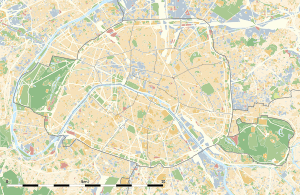Père Lachaise (Paris Métro)
| Paris Métro station | ||||||||||||||||
 | ||||||||||||||||
| Location |
63 bis, boul. de Ménilmontant Av. de la République × rue Spinoza 11th arrondissement of Paris Île-de-France France | |||||||||||||||
| Coordinates | 48°51′47″N 2°23′15″E / 48.862921°N 2.387388°ECoordinates: 48°51′47″N 2°23′15″E / 48.862921°N 2.387388°E | |||||||||||||||
| Other information | ||||||||||||||||
| Fare zone | 1 | |||||||||||||||
| History | ||||||||||||||||
| Opened | 31 January 1903 | |||||||||||||||
| Services | ||||||||||||||||
| ||||||||||||||||
| Location | ||||||||||||||||
 Père Lachaise Location within Paris | ||||||||||||||||
Père Lachaise is a station of the Paris Métro, serving line 2 and 3 on the border of the 11th and 20th arrondissements.
The station was opened on 31 January 1903 as part of the extension of line 2 (known at the time as "2 Nord") from Anvers to Bagnolet (now called Alexandre Dumas). The line 3 platforms opened on 19 October 1904 as part of the first section of the line between Père Lachaise and Villiers. It was a terminus for three months until the line was extended to Gambetta on 25 January 1905.
The station is named for the Père Lachaise Cemetery, which it serves, and which in turn takes its name from Father François d'Aix de La Chaise, confessor to Louis XIV of France. It was the location of the Barrière de Amandiers, a gate built for the collection of taxation as part of the Wall of the Farmers-General; the gate was built between 1784 and 1788 and demolished during the 19th century.[1][2]
In 1909 the station became the first metro station to have an escalator.
Station layout
| Street Level |
| B1 | Mezzanine for platform connection |
| Line 2 platforms | ||
| Westbound | ← | |
| Eastbound | | |
| Line 3 platforms | ||
| Westbound | ← | |
| Eastbound | | |
Gallery
References
| Wikimedia Commons has media related to Père Lachaise (Paris Metro). |
- ↑ "La barrière des Amandiers" (in French). Bibliothèque nationale de France.
- ↑ "La barrière des Amandiers" (in French). Bibliothèque nationale de France.
| Paris Métro | Line 2 | |
|---|---|---|

